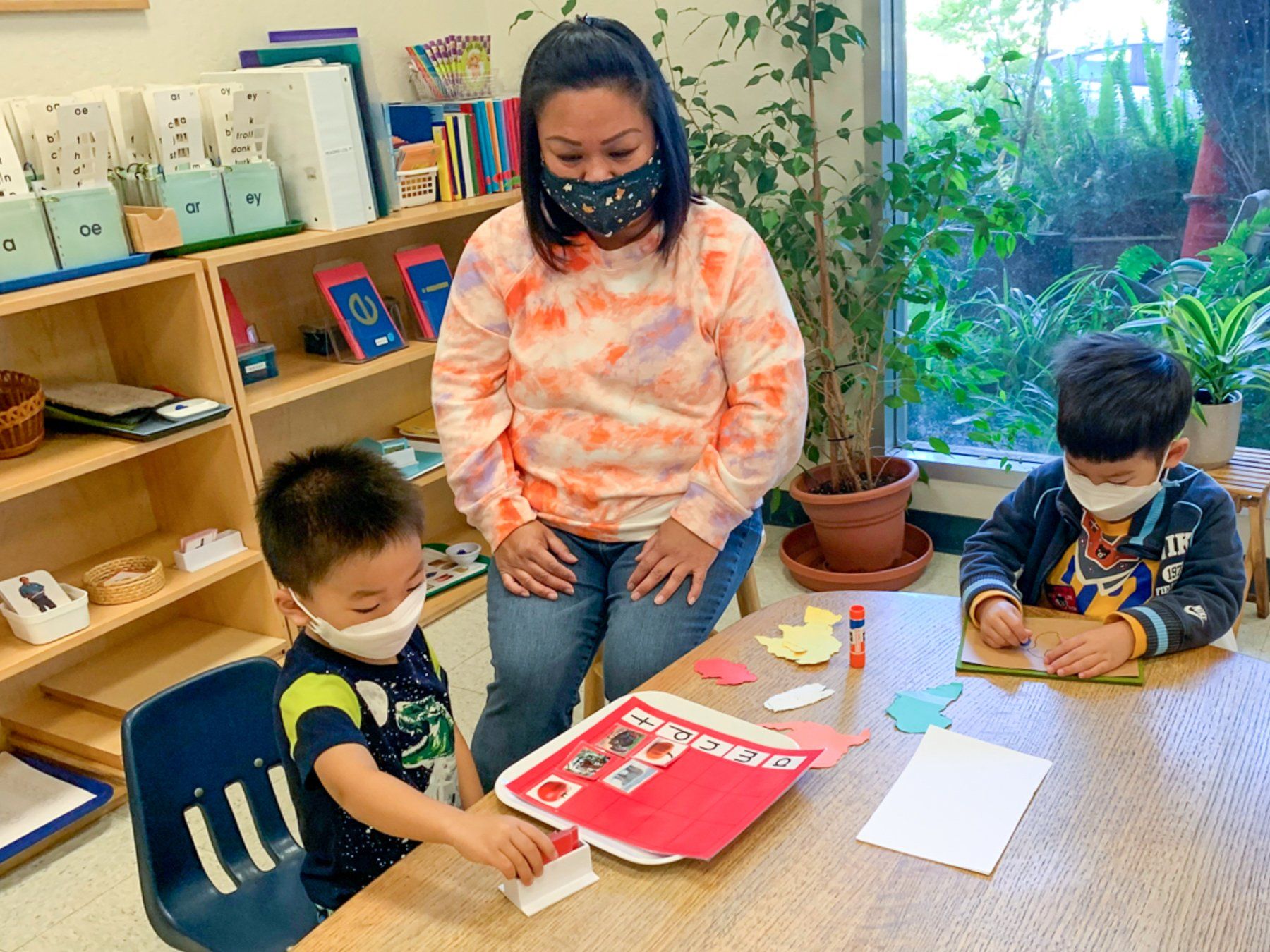5 Ways to Follow the Child

“Follow the child” is a beautiful, perfect, profound, and frequently used Montessori mantra. Those three words — a foundational element of the Montessori system — are backed by science, proven by generations of children, and consistently revered by families around the world. The phrase is an acknowledgment that each child has their own development timetable, and we need to constantly observe them in order to better understand what they need. It means noticing what the child is drawn toward and finding a way to work that into everyday life.
It may sound simple, but the truth is, in practice it can be so challenging.
Here are some manageable ways to “follow the child” in your life.
1. Stop, look, and listen.
Observation is where everything begins. It seems so obvious, but it’s hard. Balancing parenting with the rest of our lives means we are often rushing around, doing our best, and feeling stressed from time to time.
Try to find the time to slow down, stand back, watch your child, notice what they’re doing, and really listen to what they’re saying. Not just for 30 seconds, but really take some time to observe them from a distance. You may be paying close attention, but the best way to gain insight is to watch quietly until they forget you’re even there.
You will likely be amazed by what you learn.
There’s no need to even draw any concrete conclusions from what you notice; just paying attention and learning more about who your child is at this moment in time will give you amazing insight. It will inform your own parenting in ways you may not expect.
2. Make the time.
Perhaps one of the greatest challenges of parenting is finding the time for just about everything but the truth is that our children usually need more time than we do. It takes them longer to get ready in the morning, there are falls and injuries that will need tending to, there are feelings that will become hurt, and a whole bunch of other unplanned events that occur during the course of every single day.
When possible, plan some extra time into whatever you’re doing. Expect the unexpected, because it will happen, and extra time will allow you to be whatever your child needs you to be in the moment.
Do children need to learn to be flexible and keep a schedule? Absolutely! But they are learning and being able to stop and address issues as they happen is so valuable.
3. Truly and enthusiastically embrace individuality.
As parents we do everything within our power to ensure our children’s success. We care about their nutrition, their education, their emotional well-being, their social skills, and countless other aspects of their lives. We know we can’t control it all, but we just hope that all our hard work will pay off in the end, and it will! It just won’t always look exactly the way we imagined it would.
For each and every one of us there will come at least one point in time when our child will express the desire to choose a path which we did not envision for them. As long as it’s positive (not harmful or hurtful to anyone), our job is to support their endeavors. It sounds so simple, but when faced with the reality, it can be tough.
It can help to practice early and often. Maybe you always dreamed of your child following in your footsteps and playing basketball, but they are more interested in ballet. We need to honor those personal preferences in celebration of the unique person they are. Perhaps everyone else in your family is an extrovert, but your child is more introverted. It might take some adjustments and learning about their needs, but finding ways to support those needs will let them know they can count on you.
Sometimes our children will travel down paths they don’t even choose for themselves, but that we didn’t anticipate nonetheless. They may struggle with something or have incredible and unexpected strengths in other areas. No matter who they are or where their life leads them, kids need to know their parents are on their team, no matter what.
4. Examine your own biases.
Our expectations as parents come from a lifetime of information we’ve taken from our own environments and experiences. Whether positive or negative, these perceptions of how things should be color the way we parent our own children.
Remember at the beginning of this article when we encouraged you to slow down and observe your child? The same approach can be used to look within yourself. Rules, structure, and boundaries are important, as are expectations for our children. The important piece is to ask yourself often: “but, why?”
When we make parenting decisions, we can refer to some handy self-reflection questions:
● What are my values?
● Does what I’m saying reflect those values?
● Am I doing this because it was my experience as a child, or because I believe in it?
● Is this what society expects, or what I think is right?
● Does this support my child?
It’s pretty enlightening to notice some of the choices we make and what they are really based on.
5. Keep learning.
The never ending task of all humans - parents included - is to always continue learning. Some of this will happen with experience as we grow, and some of it will be information we seek out from other sources.
Not only does a continuation of learning help us to be the best parents we can be; doing so shows our children how much we value curiosity, knowledge, and self-improvement. It lets kids know that no one, not even their parents, has all the answers, and that’s okay. It’s so much more important to want to learn more, to know where to look, and to do our very best.
Do you want to learn more about Casa di Mir and how we follow the child?Let us know, we’ll be happy to provide more information!

